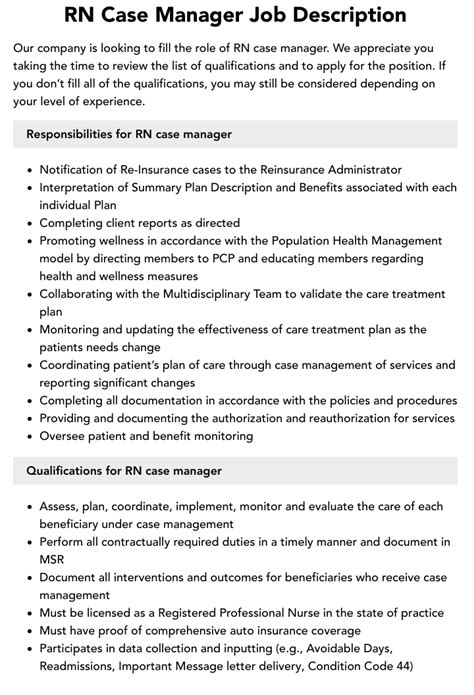Case manager jobs are a vital component of the healthcare and social services sectors, requiring professionals to coordinate and provide support services to individuals, families, or groups. These professionals work with clients to assess their needs, develop personalized plans, and ensure access to necessary resources and services. The role of a case manager is multifaceted, involving communication with clients, families, healthcare providers, and community organizations to facilitate the delivery of comprehensive care. With the increasing demand for healthcare services and the growing complexity of patient needs, the importance of case managers in navigating the healthcare system and ensuring optimal outcomes has never been more pronounced.
The responsibilities of case managers can vary significantly depending on the specific job setting, which can range from hospitals and clinics to community organizations and government agencies. However, core duties often include conducting assessments to identify client needs, developing and implementing care plans, coordinating services with healthcare providers and community resources, and advocating for clients to ensure they receive the support they require. Effective case management is built on a foundation of strong communication skills, empathy, and the ability to work collaboratively with diverse stakeholders.
Key Points
- Case managers play a critical role in coordinating healthcare and social services for individuals and families.
- The job requires strong communication and interpersonal skills, as well as the ability to work in a fast-paced, dynamic environment.
- Case managers must be knowledgeable about community resources and services to effectively connect clients with the support they need.
- Continuous professional development is essential for case managers to stay updated on best practices, new technologies, and changing healthcare policies.
- The demand for skilled case managers is expected to grow, driven by an aging population and an increased focus on preventive care and patient-centered services.
Education and Training Requirements

To become a case manager, one typically needs a bachelor’s degree in a field such as social work, nursing, or a related healthcare profession. Many case managers also pursue certifications, such as the Certified Case Manager (CCM) credential, which demonstrates expertise and commitment to the profession. Education and training programs for case managers cover a wide range of topics, including case management principles, healthcare systems, cultural competence, and ethical standards. Given the complex and often sensitive nature of their work, case managers must also develop strong emotional intelligence and coping strategies to manage the stresses of the job.
Specializations in Case Management
Within the field of case management, there are various specializations that reflect the diverse needs of different client populations. For example, some case managers specialize in working with older adults, focusing on issues related to aging, such as long-term care planning and elder abuse prevention. Others may work with children and families, addressing needs related to child welfare, education, and family support services. The field also includes case managers who specialize in mental health, substance abuse, and disability services, among others. Each specialization requires a deep understanding of the specific challenges and resources relevant to the client group, as well as the ability to adapt case management strategies to meet unique needs.
| Specialization | Description |
|---|---|
| Geriatric Case Management | Focuses on the needs of older adults, including long-term care planning and elder abuse prevention. |
| Pediatric Case Management | Addresses the needs of children and families, including child welfare, education, and family support services. |
| Mental Health Case Management | Works with individuals and families affected by mental health issues, connecting them with treatment services and support. |

Challenges and Opportunities in Case Management

Despite the rewards of working as a case manager, the profession is not without its challenges. Case managers often face high caseloads, limited resources, and the emotional demands of working with vulnerable populations. Additionally, the field is subject to regulatory changes and shifting healthcare policies, which can impact the delivery of services and the role of the case manager. However, these challenges also present opportunities for growth and innovation. The increasing recognition of the importance of case management in achieving healthcare goals and improving patient outcomes has led to expanded job opportunities and a growing demand for skilled professionals in this field.
The future of case management is closely tied to broader trends in healthcare, including the movement towards value-based care, personalized medicine, and community-based services. As healthcare systems seek to provide more efficient, patient-centered care, the role of the case manager will continue to evolve, incorporating new technologies, interdisciplinary collaboration, and a focus on preventive care and population health. For individuals considering a career in case management, the field offers a unique blend of challenges and rewards, with the potential to make a meaningful difference in the lives of others.
What are the primary responsibilities of a case manager?
+The primary responsibilities of a case manager include assessing client needs, developing and implementing care plans, coordinating services with healthcare providers and community resources, and advocating for clients to ensure they receive necessary support.
What education and training are required to become a case manager?
+To become a case manager, one typically needs a bachelor's degree in a field such as social work, nursing, or a related healthcare profession, along with certifications like the Certified Case Manager (CCM) credential.
What are some specializations within the field of case management?
+Specializations in case management include geriatric case management, pediatric case management, mental health case management, and others, each focusing on the unique needs of different client populations.
Meta Description: Discover the role of case managers in healthcare and social services, including job responsibilities, education requirements, and specializations, to understand the impact of this profession on patient outcomes and community well-being. (147 characters)



